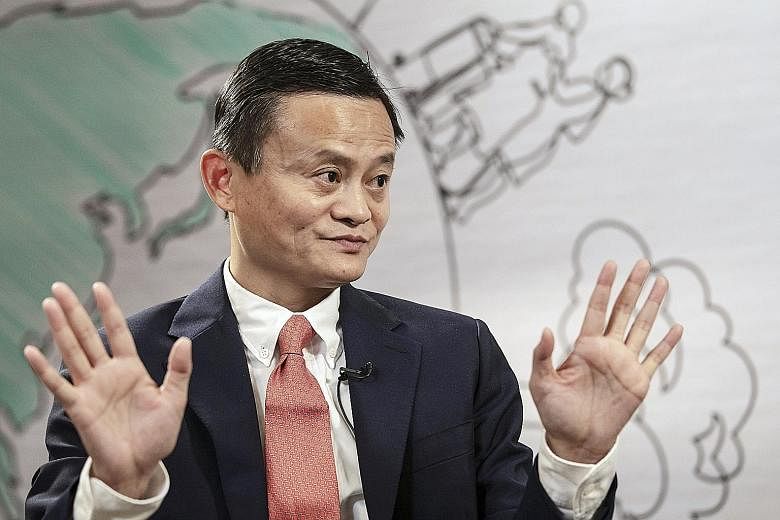Tumbling stocks, credit and trade worries, and a falling yuan have battered the wealth of China's richest people this year, with 93 of those listed on last year's Forbes China Rich List dropping out of the ranks in the 2018 edition.
More than three-quarters of the ultra-rich on last year's list witnessed a decline in their net worth, according to Forbes, and of those who remained, 229 are now poorer than they were a year ago. Nearly a third saw a decline of 20 per cent or more in their wealth.
And while all 400 of the tycoons on last year's list were worth more than US$1 billion (S$1.4 billion), the cut-off dropped to US$840 million this year, with just 344 of the 400 on the list enjoying a fortune greater than US$1 billion.
E-commerce giant Alibaba's Jack Ma returned to the top of the list for the first time since 2014 with a net worth of US$34.6 billion, down US$4 billion compared to a year ago. He traded places with real estate firm Evergrande Group's Hui Ka Yan, whose net worth of US$30.8 billion - down 28 per cent from last year - saw him fall to the No. 3 spot. He was the biggest loser of the year in dollar value terms, losing US$11.7 billion.
Mr Ma Huateng of Internet firm Tencent held on to the No. 2 spot with a net worth of US$32.8 billion after a US$6.2 billion drop.
S.F. Holding's Wang Wei, who was No. 7 on the list, was the second-biggest loser on the list this year in dollar value terms. A 33 per cent plummet in his net worth, equivalent to US$7.4 billion, left him with just US$14.9 billion to console himself. Another notable casualty of tanking stock markets was e-commerce firm JD.com's founder Richard Liu, who saw his wealth shrink by 34 per cent. He occupied the No. 30 ranking on the list with a net worth of US$6.2 billion after the company lost half of its value from a peak in January. Since August, shares of the firm have fallen by a quarter.
"The world has come to associate China with wealth creation, and it is startling to see the extent of wealth destruction this year," said Mr Russell Flannery, editor-in-chief of Forbes China.
"China's economy is more globalised than ever, and changes in the international landscape and business expectations had a big impact on the list."
-
US$1b
Just 344 of the 400 listed on the Forbes China Rich List enjoyed a fortune greater than this amount (S$1.4 billion), compared with all 400 on last year's list.
Despite the weakness in some fortunes, there were a few bright spots on this year's list. Xiaomi chief executive officer Lei Jun was No. 11 on the list after his wealth surged from US$6.8 billion a year ago to US$11.9 billion after a July listing.
Meanwhile, the net worth of the tycoon ranked No. 37 on the list, Meituan Dianping's Wang Xing, climbed from US$4.05 billion to US$5.1 billion on the back of an initial public offering in Hong Kong last month for the group-buying and meal-ordering app.
There were 12 tech newcomers in Forbes China Rich List 2018, including e-commerce site Pinduoduo's Colin Huang (No. 12, US$11.25 billion) and Sichuan hotpot chain Haidilao's co-founders Zhang Yong (No. 19, US$7.7 billion) and Shi Yonghong (No. 66, US$3.65 billion).
Pharmaceutical and healthcare tycoons made a strong showing this year. Jiangsu Hengrui Medicine CEO Sun Piaoyang topped the group with a net worth of US$10.4 billion, which he shares with his wife. He was No. 15 on the list.
The manufacturing sector was the hardest hit, with the number of those listed involved in the sector dropping to 72 from 79 and their average net worth sliding to US$1.8 billion from US$2.1 billion a year ago.
The list of China's 400 richest was compiled using shareholding and financial information from the families and individuals, stock exchanges, analysts and China's regulatory agencies. Public fortunes were calculated based on stock prices and exchange rates as of Oct 12, 2018. Private firms were valued based on similar firms that are publicly traded.


